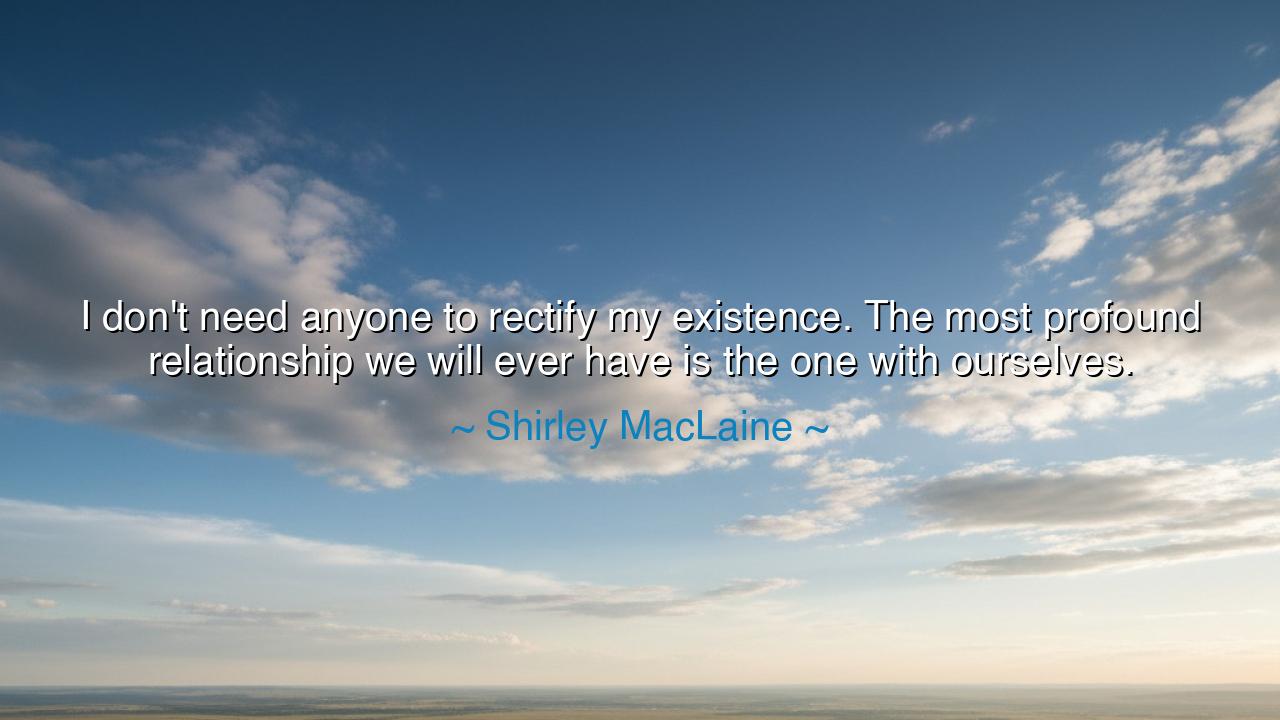
I don't need anyone to rectify my existence. The most profound
I don't need anyone to rectify my existence. The most profound relationship we will ever have is the one with ourselves.






Hear the voice of Shirley MacLaine, who spoke with the fire of independence and the calm of wisdom: “I don’t need anyone to rectify my existence. The most profound relationship we will ever have is the one with ourselves.” In this saying lies the ancient call to self-knowledge, the same truth the sages and oracles proclaimed—that to know and honor the self is the root of all strength.
When she declares, “I don’t need anyone to rectify my existence,” she breaks the illusion that worth must be granted from without. Many search for validation in lovers, companions, or the voices of the crowd, believing themselves incomplete until another confirms their value. But MacLaine rejects this bondage, affirming that existence requires no outside correction. One’s being is whole from the beginning, waiting only for recognition by its own possessor.
She then proclaims the heart of her teaching: “The most profound relationship we will ever have is the one with ourselves.” This is not loneliness but liberation, not selfishness but truth. For if a man or woman despises their own soul, how can they offer true love to another? And if they are strangers to themselves, how can they ever be known in fullness by the world? Thus, self-relationship is the foundation upon which all other bonds are built.
The origin of this wisdom is ancient, stretching back to the temple of Delphi, where the inscription “Know thyself” was carved into stone. Philosophers, prophets, and mystics across ages have echoed it: that self-awareness is the gateway to freedom, peace, and love. MacLaine, in her own voice, carries forward this eternal flame, reminding a weary age that the truest intimacy begins not outward, but inward.
Thus let this teaching be passed down: seek no rescuer to confirm your worth, no savior to mend what was never broken. Instead, cultivate the relationship with yourself, for in it you will find clarity, dignity, and the power to love others without chains. This is the wisdom of the ancients, spoken anew: to know oneself is to live whole, and to live whole is to live free.






PTphan tien
I love how MacLaine focuses on the relationship we have with ourselves, but doesn’t this also touch on a deeper issue of self-worth? How do we develop a strong connection with ourselves, especially in a world that constantly pushes us to seek validation from others? Can we ever truly be content if we don’t first learn to love and accept who we are without needing anyone to 'rectify' our existence?
QT9a1 Nguyen Thi Quynh Trang
MacLaine's quote presents an empowering perspective, yet it also raises some questions about human connection. While it’s empowering to rely on ourselves for fulfillment, is it realistic to say we don’t need anyone else? Can we be truly self-fulfilled without relationships or support from others? This makes me think about the balance between independence and interdependence—how much of our happiness comes from within and how much from others?
NLNhi luong
This quote really resonates with me because it suggests that our most important relationship is with ourselves. But does this mean we should disconnect from others in search of self-fulfillment, or can we still find joy in relationships while prioritizing self-love? How do we balance the need for connection with others and the necessity of a strong relationship with ourselves?
ANPhuongg Anhh Nguyenn
Shirley MacLaine’s quote really emphasizes the importance of self-acceptance. It makes me wonder: how often do we seek validation from others instead of finding peace with ourselves? Is it possible to truly be content and fulfilled if we are constantly seeking approval or rectification from external sources? Maybe the key to a happy life is truly understanding and accepting ourselves, without needing anyone else to 'fix' us.